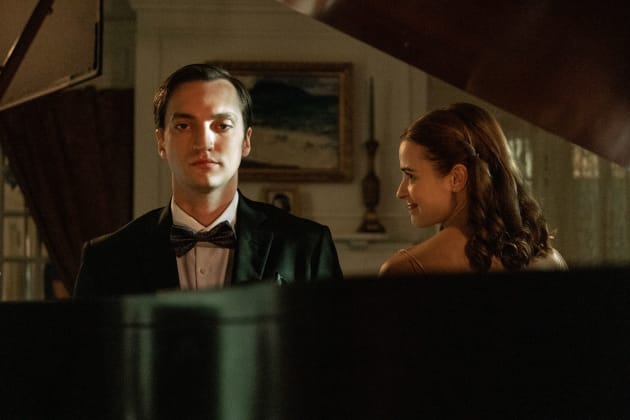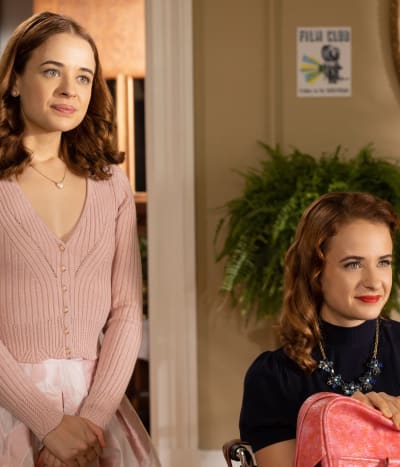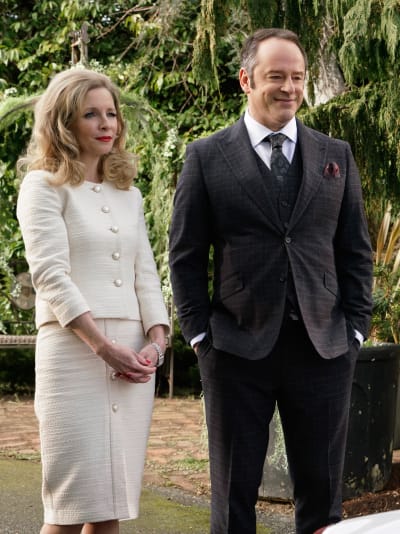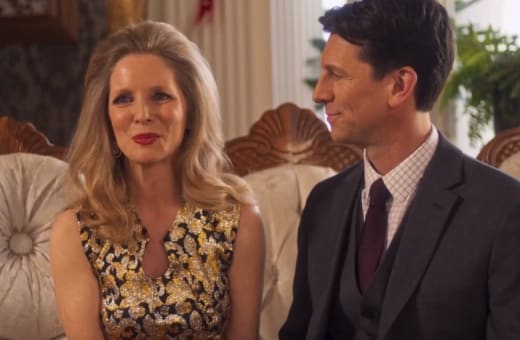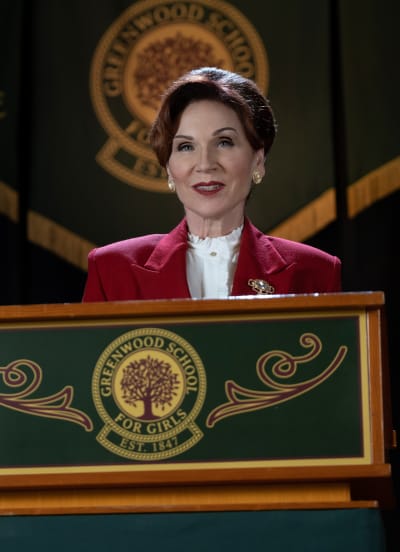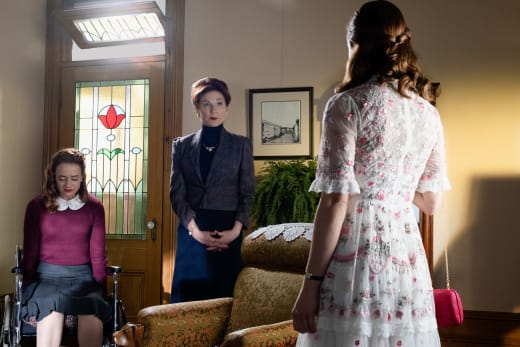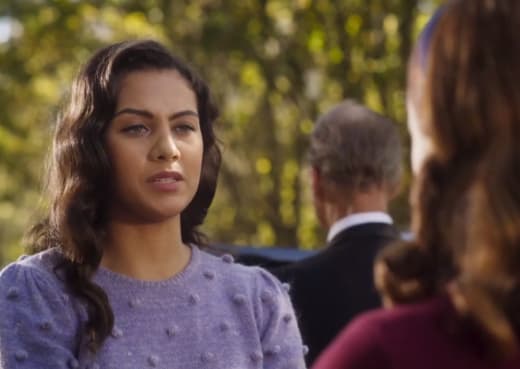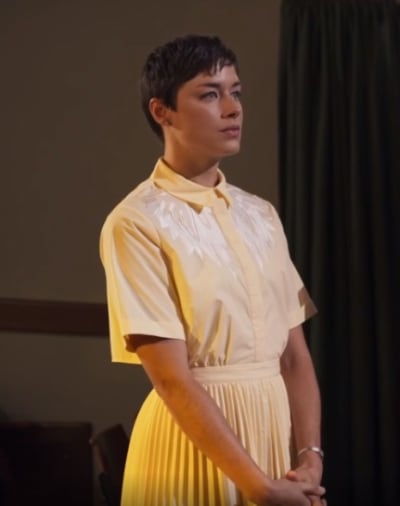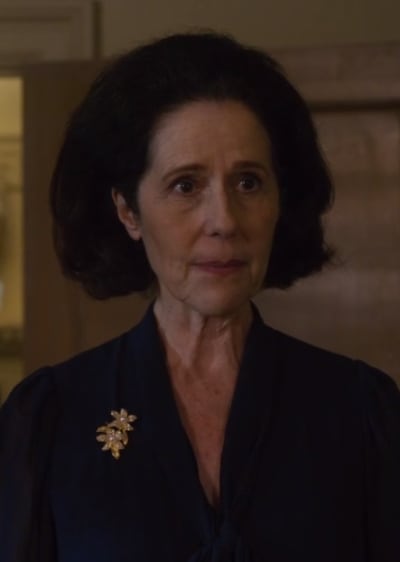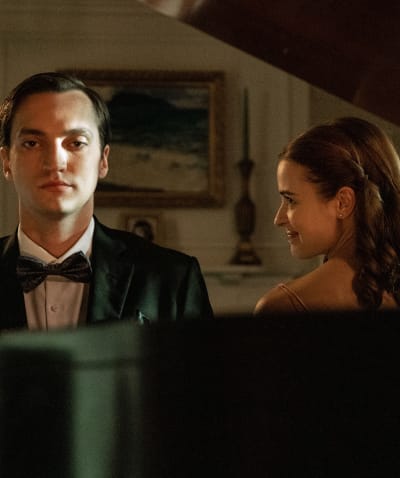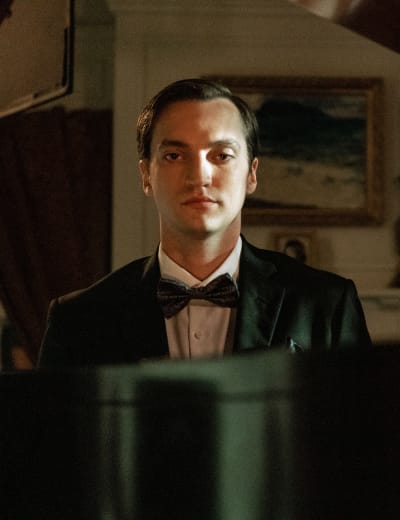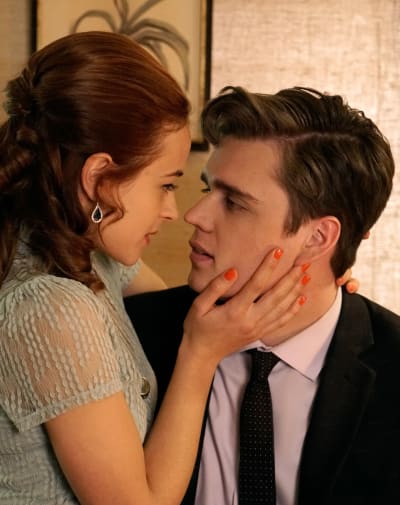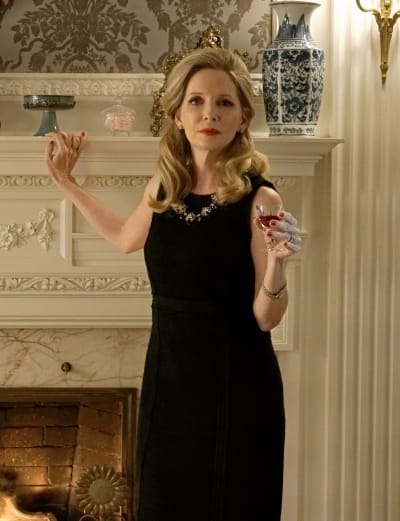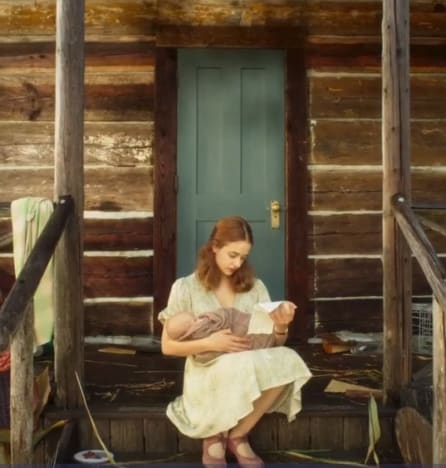Oh, my, my, my. One thing you’re not going to say is that Lifetime’s V.C. Andrews series aren’t entertaining.
V.C. Andrews’ Pearl in the Mist is no exception. Ruby is as fiery as her flaming red hair, and life is not cutting her a break.
But by the film’s end, she was back in the Bayou with her and Beau’s bastard baby and considering a marriage proposal from her hot half-brother. You know, just V.C. Andrews things!
So far, this series is a bunch of missed opportunities. Where you’d expect to find out some more about the Dumas and Landry lineage, given all of the secrets, deceit, baby-selling, and scandal, we keep chugging along with Ruby fighting bigotry and putting up with her wild-child sister and evil stepmother.
Ruby’s lack of interest in her family history after everything she found out about later is bizarre AF, and her relationship with her father never went beyond surface-level indulgence.
Now, Pierre is deader than my hopes and dreams during a pandemic, and Ruby never got to know him. It feels like a missed opportunity to see any form of deeper relationship blossom between this aloof father and his long-lost daughter.
They had Gil Bellows, and he was kind of just … there. And come on, good old Pierre died from a “heart attack?” Poppycock, I say!
Are we to believe that Daphne and Bruce didn’t have an affair and plot Pierre’s demise, killing him and taking all of his money? It’s my story, and I’m sticking to it.
Daphne Dumas was gaslight, gatekeep, and Girlbossing before it was cool. The woman lived for power, money, and image, and she didn’t hide it an iota. She’s loathsome, but also, the woman handles her business.
Can we get a collective round of applause for Lauralee Bell bringing all of that soap opera goddess goodness to this role?
As loathsome as Daphne was, damn me if I didn’t dig the frosty energy, simmering rage below a placid exterior, and the fact that this woman in the ’60’s finessed her way to having complete control of the Dumas fortune.
Bell gave us dramatic cinema even when the role itself didn’t blossom to its full potential. And that was a running theme throughout.
We had the queen that is Marilu Henner playing Mrs. Ironwood, and it felt as if we barely uncapped the full breadth of the character and how bigoted and wicked she was.
Ruby was excited about heading to the boarding school for girls until she found out that Daphne and Ironwood, with their Real Housewives of Bad and Bougie, joined forces to make her life a living hell the entire time.
Mrs. Ironwood’s disdain for Cajuns was ridiculous. Everyone’s hatred for the Bayou folks is, I mean, they utter Cajun like it’s a slur and talking about the swamp people in the same vein as folks spoke of Romani, and it’s mind-blowing that the deep-seated hatred, disgust, and bigotry is at this level.
Ruby never stood a chance upon arriving, and Ironwood was deadset on blaming any and everything on Ruby. For some reason, Giselle continued to be as meanspirited as she wanted and had an entire clique to snicker at her comments and cater to her every whim, but Ruby was the one who paid the price for everything all the time.
Giselle was the worst, for the sake of fun, but the Bannos played off of one another well. Raechelle brought dimension to Ruby, whereas Karina’s Giselle never had a chance to develop beyond surface-level, but she had fun in the role regardless.
All Ruby wanted to do was paint, chill out with her unorthodox besties, and mind her business, but no one at that school for the rich and snobby would let her be great.
She was surrounded by some interesting characters, too, and it’s a pity that we didn’t get more time with some of them or concrete closure.
The boarding school for the bigoted was on some bullcrap from the very beginning. Of the many offenses, the treatment of Abby took the cake.
God bless Ruby’s heart; inquiring minds want to know how a Bayou broad who likely grew up around Black, Cajun, Creole, “Mestizo,” and “Mulatto” folk couldn’t identify who was clearly supposed to present as a biracial girl at first sight? Louis could’ve seen it.
The racial dynamics in both films were generally interesting. In Houmas, Ruby and her grandmother were around Black people all the time and never thought much about it. The man who bought all of Ruby’s art was a successful Black man who sold some to her father.
But then in New Orleans, at the Dumas home, all the servants were Black, and Ruby went to see a voodoo priestess. Giselle had a ball calling Abby out for being a “half-breed” who passed as if it was the worst thing in the world, but she didn’t mind making out with her biracial/Asian boy toy, Marcus.
Much like relationships marked on Facebook, the social construct that is race is firmly marked “it’s complicated.”
Ruby remarking on Abby’s tan was easily one of the most cringeworthy scenes of the film, and with this, that says a lot. But the shared plight of being, gasp, part Negro, or a Swamp Cajun in the world of bourgeoisie French Creoles bonded the two, and their friendship was the sweetest.
Good grief, Giselle knows how to ruin everything and everyone, doesn’t she?
Abby getting shunned from all the boys at the dance who didn’t want to be caught dead actually learning how to dance with rhythm from the biracial girl was brutal, and Mrs. Ironwood’s casual racism when speaking of removing this undesirable girl tainting her precious school was worse.
But Abby left on her own terms, walked out with her head held high, and I’d honest to goodness love to see her again.
Of course, she wasn’t the only one who was cursed for daring to be close to Ruby. Keeping up the trend of weeding out undesirables, poor Ms. Stevens caught a stray bullet in Giselle’s neverending quest to irritate the hell out of her twin.
Again, bless Ruby’s little heart for not picking up that her beloved art teacher was a lesbian. Well, before she snorted at the mere thought that buff groundskeeper Zaddy Buck (the name alone, am I right?) was handsome, Ms. Stevens didn’t come across as if she was hiding that she was a card-carrying member of the queer community.
But, of course, it was the south, and the ’60s, and a bunch of uptight, wealthy socialites with some warped sense of morality and purity, so of course, they sent her packing too.
She was the best teacher, too.
She was warm, friendly, appreciative of Ruby’s talent, and she went to bat for Ruby when Giselle pulled another one of her stunts that almost got Ruby expelled. You couldn’t ask for a better teacher and friend, and it sucks that they shuffled her off with no fanfare offscreen, and Ruby didn’t even get to say goodbye.
And to complete the trifecta, Buck got the boot too.
Buck’s singular purpose was to look smoking hot, whisper about how forbidden it was that he be near any of the girls, and then lose the fight against temptation by swinging his ax into an underaged student.
It wasn’t even the most inappropriate relationship in the series so far, so what else is there to say? He was the embodiment of a one-dimensional plot-device, but what a body he was.
Thanks for being hot, Buck. We very much appreciated the eye candy. Sorry that taking newly able-bodied Giselle for a spin cost you your job, but maybe it was a blessing in disguise.
At this point, it was enough to make you wonder if Ruby didn’t keep that black cat neckbone good luck charm because she was going through it at that place.
The only newbie who didn’t get burned by befriending Ruby and even benefitted from it was Louis.
What is it with these girls and the irresistible allure they possess that attracts, like, all the men? From platonic, romantic, sexual, or familial, much like Heaven, Ruby had any male in the vicinity enamored.
Ruby’s friendship with Louis had so much sexual tension that it almost felt as if she’d start something with him even though she was still seeing Beau.
The time she spent at the Clairborne mansion was fascinating. Mrs. Clairborne was such an underrated character, and I loved the vibes she gave off that she was probably on the Spectrum.
She came across as a recluse more so than a judgmental harpy like the others around that place, and Louis seemed to have her wrapped around his finger.
Louis, expertly played by The 100‘s Richard Harmon, was an intriguing character as well, and his infatuation with Ruby, oddly enough, never veered towards possessive or territorial.
He had feelings for her, you could tell, and he thought the world of her, even crediting her for serving as a safe harbor for him and improving his sight.
Initially, it did feel as if Ruby was playing with the guy’s emotions a bit. I mean, did she have to laugh at the guy for his inexperienced attempt at kissing her?
However, the closest they came to a physically intimate moment was the disturbing scene of him recounting the real reason behind his father murdering his mom.
Abuse victims may indeed have complex feelings about their abusers, especially when that person is their parent. However, I’m not going to be losing sleep at night over Louis’ father murdering his pedophilic wife.
Mrs. Clairborne’s actions were horrific, and not only did she do them to her son, but she repeated them with another boy when her husband caught her.
It’s enough to leave Louis screwed up. The trauma of witnessing the murder-suicide cost him his sight, but it’s a wonder Louis turned out relatively well-adjusted at all.
He’s another character who left an impression on Ruby, and it’s a pity that she didn’t get to say goodbye to him before she left. Louis confiding in Ruby served as another reminder that we learned more about the Clairborne history than the Landrys or Dumas’.
And the only thing we know about Beau is that he loves Ruby, doesn’t know how to pull out, and got shipped away to France. But we sure as hell haven’t seen the last of him.
A puritan Ruby is not, and she took to good times with Beau with ease. The transition between heavy petting and quite literally rolling around in the hay was a piece of cake for Ruby. But then, she often had a more progressive edge to her, so does Giselle.
Ruby and Beau made their relationship work until the moments before he departed for France — it’s not surprising. But despite how undeniably attractive Banno and Wood are, it’s hard to buy into their love story and compatibility. Perhaps it’s because of how little time they’ve spent with one another talking and all.
Nevertheless, despite how respectable Beau is, Daphne was not about to have a bastard grandbaby, so she sent Ruby to the abortion clinic. Kudos for the inspired thinking with that. It was a refreshing change from all the baby-selling that happened before.
You’d think the barren woman who had to purchase a child (and promptly got a Buy One Get One Free deal she didn’t expect years later) would lock Ruby away in some ward of the Dumas mansion until she had the kid, not try to force her to abort it.
Knowing Daphne, she was pissed that after all that hard work she put in bagging a new husband and writing Ruby out of Pierre’s will, Ruby screwed up her respectable Dumas image.
The real surprise should’ve been that Giselle wasn’t the one bringing home a bouncing baby first. A point even Giselle couldn’t help making.
Ruby returning to the Bayou was probably the best thing for her. Although, it sucked that she didn’t spend her time painting or something. And when all hell broke loose, she at least had Paul to fall back on.
Almost literally, if Paul had his way. The man refuses to accept that it’s wrong to want to bone your sister. He didn’t even care that she was bearing another man’s child.
The weird time-jump that happened between Ruby and this film was a bit jarring. Last we knew, Paul arrived at the Dumas home, but he didn’t have a reason, we don’t know what the trip was for, and he was gone by the time this movie started.
Paul insists that no one has to know that they’re related. His love for her is unconditional, and he wants to be with her.
And after a long night of bearing a baby in the middle of a horrible storm with Paul channeling some Jim Carey face acting while trying his damndest to secure the shack, Ruby read Giselle’s unexpected letter.
The only thing crazier than Giselle writing Ruby a letter where she admitted that she missed her was that it was in no way destroyed or vanished during the storm.
Finding out that Beau was figuring out how the French really kiss with a new fiancee prompted Ruby to consider Paul’s offer of marriage so that little Pearl Landry Dumas could have a daddy.
OK, Ruby. So, we’re really doing this? Cool, cool, cool.
Over to you, Lifetime Fanatics. Are you rooting for Ruby and Beau or Ruby and Paul? Is Giselle the worst? Hit the comments below!
All that Glitters, the third part of the Landry saga, airs Saturday, March 27 at 8/7c.
Jasmine Blu is a senior staff writer for TV Fanatic. Follow her on Twitter.
